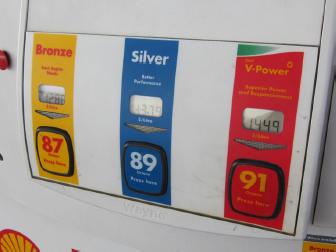
Modern fuels hate your classic car
Old-auto enthusiasts need to be careful when pulling up to the pump
by Jil McIntosh |Driver.com April 15, 2019
 Spring has sprung, and that means classic cars are coming out of winter hibernation. They’ll get their oil changed and their brakes checked, which is good for them. They’ll also get a tank of gas—and that might not be quite as beneficial. Gasoline has been tweaked over the years for environmental reasons, and that can present a problem for older engines. Before you fill the tank, find out what’s in your gas, and what it might be doing to your vehicle. Spring has sprung, and that means classic cars are coming out of winter hibernation. They’ll get their oil changed and their brakes checked, which is good for them. They’ll also get a tank of gas—and that might not be quite as beneficial. Gasoline has been tweaked over the years for environmental reasons, and that can present a problem for older engines. Before you fill the tank, find out what’s in your gas, and what it might be doing to your vehicle.

Ethanol
 Ethanol is alcohol that, in Canada, is primarily made from corn or wheat. On the plus side, it’s a renewable fuel. It also burns cleaner than gasoline, and it has a high-octane rating. But it ticks a lot of boxes on the minus side. It has less energy than gasoline, so it gets poorer mileage. It’s hygroscopic, meaning it absorbs water, including from condensation and even humid weather. It’s also corrosive and can chew up cork and rubber seals. That’s seldom an issue in newer vehicles, since they’re built to handle a small amount of it, but older engines weren’t designed for it. Ethanol is alcohol that, in Canada, is primarily made from corn or wheat. On the plus side, it’s a renewable fuel. It also burns cleaner than gasoline, and it has a high-octane rating. But it ticks a lot of boxes on the minus side. It has less energy than gasoline, so it gets poorer mileage. It’s hygroscopic, meaning it absorbs water, including from condensation and even humid weather. It’s also corrosive and can chew up cork and rubber seals. That’s seldom an issue in newer vehicles, since they’re built to handle a small amount of it, but older engines weren’t designed for it.
 It’s mandated that gasoline has to contain 10 per cent ethanol, known as E10, spread out over all the fuel each company sells. Most oil companies used to blend it into the lower grades, but leave the premium pump ethanol-free. Unfortunately, it’s now rare to find any fuel that doesn’t contain at least some ethanol—and even if one station sells pure-premium fuel, you can’t always guarantee the next one will, even if it’s the same brand. There are a few online sites that track stations with ethanol-free pumps, including Pure-Gas.org, to help you scout out locations. It’s mandated that gasoline has to contain 10 per cent ethanol, known as E10, spread out over all the fuel each company sells. Most oil companies used to blend it into the lower grades, but leave the premium pump ethanol-free. Unfortunately, it’s now rare to find any fuel that doesn’t contain at least some ethanol—and even if one station sells pure-premium fuel, you can’t always guarantee the next one will, even if it’s the same brand. There are a few online sites that track stations with ethanol-free pumps, including Pure-Gas.org, to help you scout out locations.
 If you have to settle for ethanol-infused fuel, most auto parts stores sell ethanol fuel treatment additives, which can help solve water and corrosion issues. We won’t recommend specific brands, but we do recommend the following: If you have to settle for ethanol-infused fuel, most auto parts stores sell ethanol fuel treatment additives, which can help solve water and corrosion issues. We won’t recommend specific brands, but we do recommend the following:
 Read and follow the label; Read and follow the label;
 Use the correct amount (more isn’t always better); Use the correct amount (more isn’t always better);
 Look for one that doesn’t contain ethanol or alcohol (many of them do, and you definitely don’t want to add more); Look for one that doesn’t contain ethanol or alcohol (many of them do, and you definitely don’t want to add more);
 Make sure it’s for gasoline, not diesel; Make sure it’s for gasoline, not diesel;
 Look for name brands; Look for name brands;
 Be wary of products that make too-good-to-be-true claims, like saying it’ll actually remove the ethanol (it can’t; it’s just trying to prevent problems) or that you only need a tiny amount to treat a whole tank of fuel; Add fuel stabilizer to any gasoline cans you might have stashed in the garage, or that you carry along on driving trips. Try not to store fuel for more than three months. Be wary of products that make too-good-to-be-true claims, like saying it’ll actually remove the ethanol (it can’t; it’s just trying to prevent problems) or that you only need a tiny amount to treat a whole tank of fuel; Add fuel stabilizer to any gasoline cans you might have stashed in the garage, or that you carry along on driving trips. Try not to store fuel for more than three months.
 Dealing with ethanol is especially important in older cars, because they tend not to be driven all that much even in good weather, along with that long winter sleep. When you put it back in storage next fall, fill the tank completely – with ethanol-free, if you can find it – and no matter what grade you’ve bought, add a can of fuel stabilizer. Dealing with ethanol is especially important in older cars, because they tend not to be driven all that much even in good weather, along with that long winter sleep. When you put it back in storage next fall, fill the tank completely – with ethanol-free, if you can find it – and no matter what grade you’ve bought, add a can of fuel stabilizer.
 Octane
Octane
 Rather than a problem with the fuel itself, octane issues are usually related to how the engine behaves. With a newer vehicle, putting premium gasoline into one that’s rated for 87-octane usually does little more than put a hole in your wallet. However, in a classic car, you may want to stop at the pricier pump, no matter what your engine was originally rated to take. Octane isn’t an additive. Instead, the amount of octane in fuel depends on how it’s refined. While high-octane fuel sounds like it’s the super-powerful stuff, it’s actually less volatile than 87-octane grade. That’s important in high-compression engines, where high heat can cause various pinpoints of detonation in lower-grade fuel, or worse, spontaneous combustion before the spark plug fires. Rather than a problem with the fuel itself, octane issues are usually related to how the engine behaves. With a newer vehicle, putting premium gasoline into one that’s rated for 87-octane usually does little more than put a hole in your wallet. However, in a classic car, you may want to stop at the pricier pump, no matter what your engine was originally rated to take. Octane isn’t an additive. Instead, the amount of octane in fuel depends on how it’s refined. While high-octane fuel sounds like it’s the super-powerful stuff, it’s actually less volatile than 87-octane grade. That’s important in high-compression engines, where high heat can cause various pinpoints of detonation in lower-grade fuel, or worse, spontaneous combustion before the spark plug fires.
 Premium fuel resists this pre-ignition, and creates an even flame that spreads gradually through the chamber (relatively, of course, since it happens in a split-second). Older engines can be more susceptible to pre-ignition, and using premium fuel can help to prevent it. Premium fuel resists this pre-ignition, and creates an even flame that spreads gradually through the chamber (relatively, of course, since it happens in a split-second). Older engines can be more susceptible to pre-ignition, and using premium fuel can help to prevent it.
Editor’s Note: Article from Driver.com
|